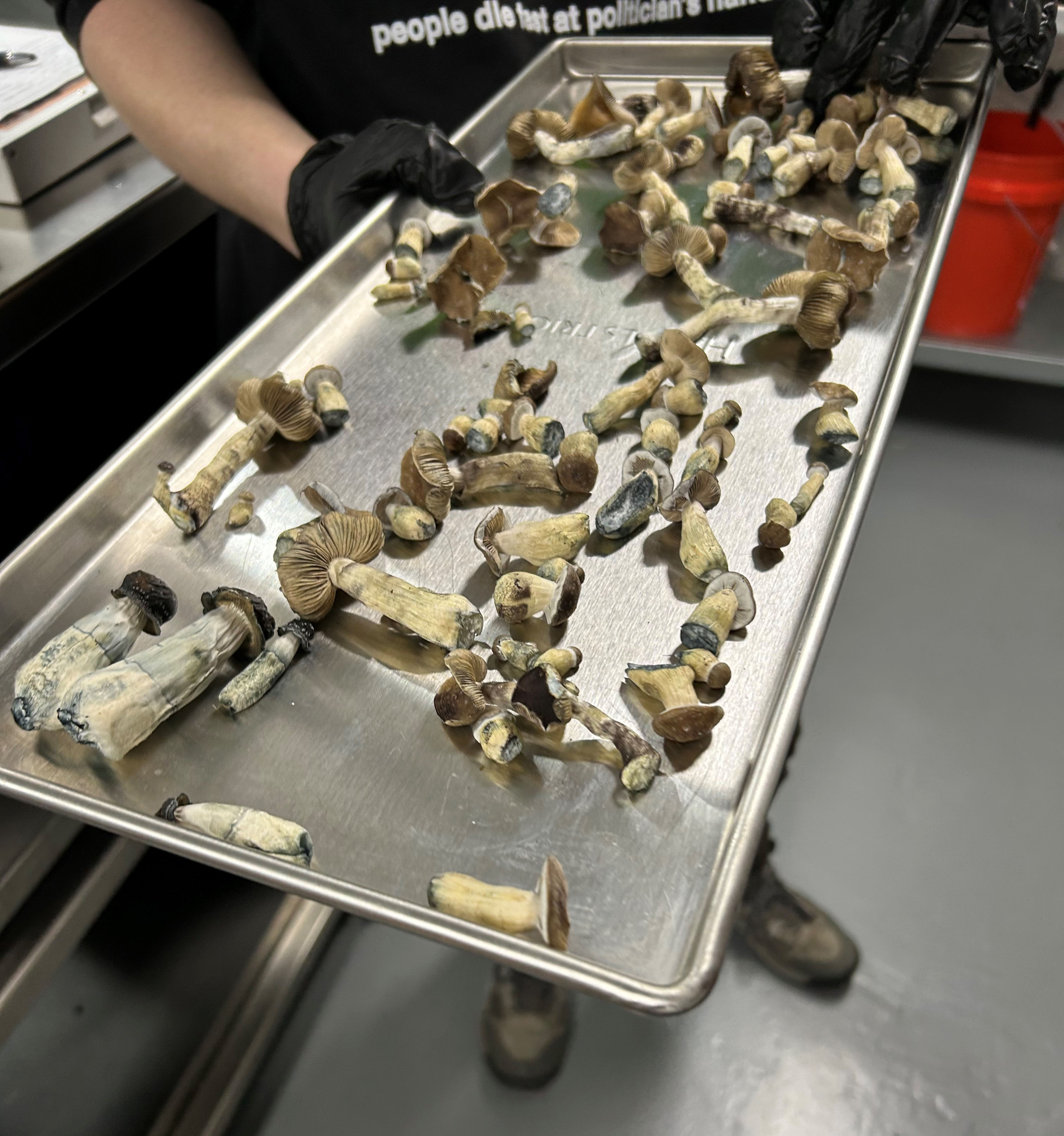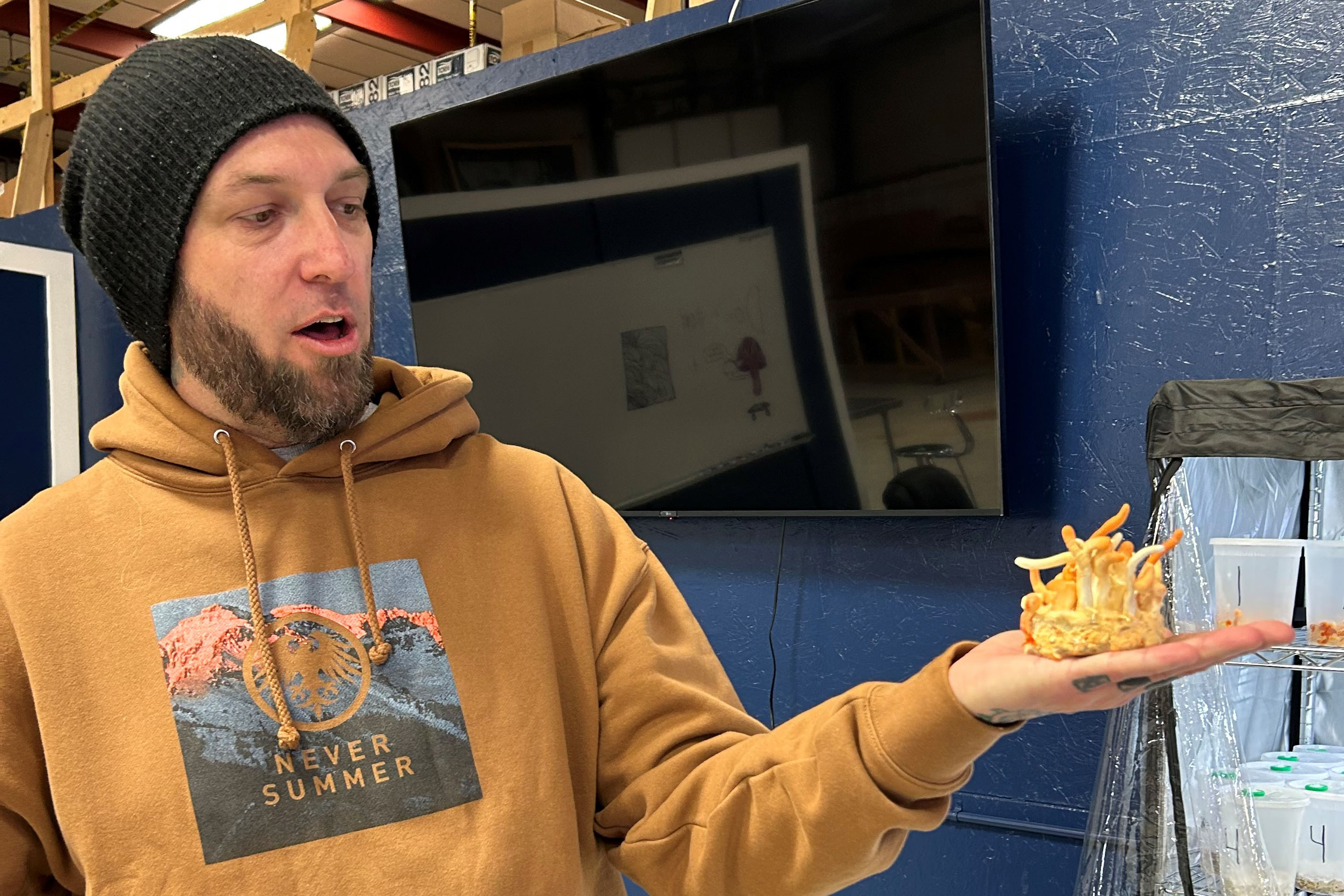BOULDER, Colo. — Colorado regulators are issuing licenses for providing psychedelic mushrooms and are planning to authorize the state’s first “healing centers,” where the mushrooms can be ingested under supervision, in late spring or early summer.
The dawn of state-regulated psychedelic mushrooms has arrived in Colorado, nearly two years since Oregon began offering them. The mushrooms are a Schedule I drug and illegal under federal law except for clinical research. But more than a dozen cities nationwide have deprioritized or decriminalized them in the past five years, and many eyes are turned toward Oregon’s and Colorado’s state-regulated programs.
“In Oregon and Colorado, we’re going to learn a lot about administration of psychedelics outside of clinical, religious, and underground settings because they’re the first to try this in the U.S.,” said William R. Smith, an assistant professor of psychiatry at the University of North Carolina School of Medicine.
Psychedelic mushrooms and their psychoactive compound psilocybin have the potential to treat people with depression and anxiety, including those unresponsive to other medications or therapy. The National Institute on Drug Abuse, part of the National Institutes of Health, says the risk of mental health problems caused by ingesting mushrooms in a supervised clinical setting is low, but may be higher outside of a clinical setting. Robert F. Kennedy Jr. said in a social media post last year, before his nomination as U.S. health secretary, that his “mind is open to the idea of psychedelics for treatment.”
Medical experts say more research is needed, particularly in people with a diagnosis or family history of psychotic or bipolar disorder. Adverse effects of psilocybin, including headache and nausea, typically resolve within one to two days. However, extended difficulties from using psychedelics can last weeks, months, or years; anxiety and fear, existential struggle, social disconnection, and feeling detached from oneself and one’s surroundings are most common. After the decriminalization and legalization in Oregon and Colorado, psychedelic mushroom exposures reported to poison control centers ticked up in these states and nationally.
In February, about 40 people organized by the psychedelic advocacy group the Nowak Society gathered in Boulder to talk about the coming changes in Colorado. They included Mandy Grace, who received her state license to administer psychedelic mushrooms, and Amanda Clark, a licensed mental health counselor from Denver, who both praised the therapeutic power of mushrooms.
“You get discouraged in your practice because the current therapies are not enough for people,” Clark said.
Colorado voters approved Proposition 122 in 2022 to legalize natural psychedelics, after Oregon voters in 2020 approved legalizing psilocybin for therapeutic use. Colorado’s program is modeled after, but not the same as, Oregon’s, under which 21,246 psilocybin products have been sold as of March, a total that could include secondary doses, according to the Oregon Health Authority.
As of mid-March, Colorado has received applications for at least 15 healing center licenses, nine cultivation licenses, four manufacturer licenses, and one testing facility license for growing and preparing the mushrooms, under rules developed over two years by the governor-appointed Natural Medicine Advisory Board.
Psychedelic treatments in Oregon are expensive, and are likely to be so in Colorado, too, said Tasia Poinsatte, Colorado director of the nonprofit Healing Advocacy Fund, which supports state-regulated programs for psychedelic therapy. In Oregon, psychedelic mushroom sessions are typically $1,000 to $3,000, are not covered by insurance, and must be paid for up front.
The mushrooms themselves are not expensive, Poinsatte said, but a facilitator’s time and support services are costly, and there are state fees. In Colorado, for doses over 2 milligrams, facilitators will screen participants at least 24 hours in advance, then supervise the session in which the participant consumes and experiences mushrooms, lasting several hours, plus a later meeting to integrate the experience.

Facilitators, who may not have experience with mental health emergencies, need training in screening, informed consent, and postsession monitoring, Smith said. “Because these models are new, we need to gather data from Colorado and Oregon to ensure safety.”
Facilitators generally pay a $420 training fee, which allows them to pursue the necessary consultation hours, and roughly $900 a year for a license, and healing centers pay $3,000 to $6,000 for initial licenses in Colorado. But the up-front cost for facilitators is significant: The required 150 hours in a state-accredited program and 80 hours of hands-on training can cost $10,000 or more, and Clark said she wouldn’t pursue a facilitator license due to the prohibitive time and cost.
To increase affordability for patients in Colorado, Poinsatte said, healing centers plan to offer sliding-scale pay options, and discounts for veterans, Medicaid enrollees, and those with low incomes. Group sessions are another option to lower costs.
Colorado law does not allow retail sales of psilocybin, unlike cannabis, which can be sold both recreationally and medically in the state. But it allows adults 21 and older to grow, use, and share psychedelic mushrooms for personal use.
Despite the retail ban, adjacent businesses have mushroomed. Inside the warehouse and laboratory of Activated Brands in Arvada, brown bags of sterilized grains such as corn, millet, and sorghum and plastic bags of soil substrate are for sale, along with genetic materials and ready-to-grow kits.
Co-founder Sean Winfield sells these supplies for growing psychedelic or functional mushrooms such as lion’s mane to people hoping to grow their own at home. Soon, Activated Brands will host cultivation and education classes for the public, Winfield said.
Winfield and co-founder Shawn Cox recently hosted a psychedelic potluck at which experts studying and cultivating psychedelic mushrooms discussed genetics, extraction, and specialized equipment.

Psychedelic mushrooms have a long history in Indigenous cultures, and provisions for their use in spiritual, cultural, or religious ceremonies are included in Colorado law, along with recognition of the cultural harm that could occur to federally recognized tribes and Indigenous people if natural medicine is overly commercialized or exploited.
Several studies over the past five years have shown the long-term benefits of psilocybin for treatment-resistant major depressive disorder, and the Food and Drug Administration designated it a breakthrough therapy. Late-stage trials, often a precursor to application for FDA approval, are underway.
Smith said psilocybin is a promising tool for treating mental health disorders but has not yet been shown to be better than other advanced treatments. Joshua Woolley, an associate professor of psychiatry and behavioral sciences at the University of California-San Francisco, said he has seen the benefits of psilocybin as an investigator in clinical trials.
“People can change hard-set habits. They can become unstuck. They can see things in new ways,” he said of treating patients with a combination of psilocybin and psychotherapy.
Colorado, unlike Oregon, allows integration of psilocybin into existing mental health and medical practices with a clinical facilitator license, and through micro-healing centers that are more limited in the amounts of mushrooms they can store.
Still, Woolley said, between the federal ban and new state laws for psychedelics, this is uncharted territory. Most drugs used to treat mental health disorders are regulated by the FDA, something that Colorado is “taking into its own hands” by setting up its own program to regulate manufacturing and administration of psilocybin.
The U.S. Attorney’s Office for the District of Colorado declined to comment on its policy toward state-regulated psychedelic programs or personal use provisions, but Poinsatte hopes the same federal hands-off approach to marijuana will be taken for psilocybin in Oregon and Colorado.
Winfield said he looks forward to the upcoming rollout and potential addition of other plant psychedelics, such as mescaline. “We’re talking about clandestine industries coming into the light,” he said.
KFF Health News is a national newsroom that produces in-depth journalism about health issues and is one of the core operating programs at KFF—an independent source of health policy research, polling, and journalism. Learn more about KFF.
USE OUR CONTENT
This story can be republished for free (details).






